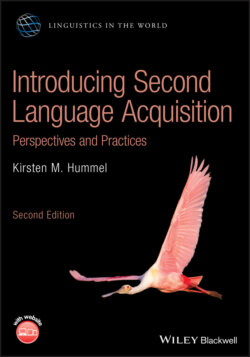Читать книгу Introducing Second Language Acquisition - Kirsten M. Hummel - Страница 24
2.4.2 universal grammar
ОглавлениеWhile behaviorists highlighted the environment as the principal agent in bringing about language, a radically different view emerged largely in reaction to that mechanistic behaviorist model. In the Universal Grammar (UG) view, the environment serves essentially only as a trigger for language development. The UG approach views language as unique and different from other cognitive systems. It suggests that humans possess what can be considered as a “language faculty,” i.e. a universal set of underlying principles, called UG, which lends its name to this theoretical approach. The existence of UG allows children to form hypotheses about language when they are exposed to a finite set of examples from their environment. In this regard, UG linguists refer to what has been called the “logical problem of language acquisition,” i.e. that without UG, language learning would be impossible because the input data are insufficiently rich to allow acquisition to occur. The inadequacy of the input is also referred to as the “poverty of the stimulus.” In other words, the language that children are exposed to is characterized by abbreviated utterances, interruptions, ungrammatical sequences, etc., such that they could not possibly receive enough information about all the grammatical, possible sentences of the language by exposure alone; something else must be helping children induce the rules of the language, and that something is the proposed “Universal Grammar” they are born with as part of their genetic endowment. This approach is therefore nativist, in emphasizing the biologically inherited aspect of UG.
Universal Grammar (UG)
The innate principles and properties that characterize the grammars of all human languages; also used to describe the theoretical view associated with this concept.
This view also emphasizes that first words “… are the culmination of previous, complex language development … words … develop in parallel to acquisition of the formal system of language, and in part as a result of this” (Lust 2006, p. 263).
The species‐specific nature of language is also emphasized in this approach: language is unique to humans; other species' communication systems are fundamentally different from human language.
